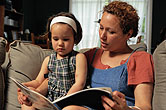
THURSDAY, March 6, 2014 (HealthDay News) — Taking part in family activities on a regular basis benefits the social and emotional health of young children, a new study finds.
And the more of these shared family routines, the better.
“Social-emotional health” is defined as being able to understand emotions, express empathy, have self-control and form good relationships with other children and adults.
Researchers looked at parent-provided data about 8,550 preschool kids in the United States to assess how often the children did things with their families, such as eating dinner, singing, reading books, playing and telling stories.
Fifty-seven percent of children participated in three or more regular family activities and more than 16 percent of the children had high social-emotional health.
The researchers also found that children who took part in five regular family activities were more than twice as likely to have high social-emotional health. Moreover, for each additional activity that parents and children do together, the child is nearly 50 percent more likely to have high social-emotional health.
The study was published in the February/March issue of the Journal of Developmental and Behavioral Pediatrics.
“High social-emotional health has been associated with greater academic performance and improved behavior in the school environment,” study leader Dr. Elisa Muniz, a developmental-behavioral pediatrician at Bronx-Lebanon Hospital Center, said in a news release from the Children’s Hospital at Montefiore (CHAM) in New York City.
“Our findings suggest that parents with preschool-aged children who regularly practice family routines together have greater social-emotional health and so we encourage families to sing, read, play and eat together on a regular basis,” said Muniz, who led the research while a fellow at the Children’s Evaluation and Rehabilitation Center at Albert Einstein College of Medicine of Yeshiva University, affiliated with CHAM.
Participating in regular family activities can give children a sense of security and belonging, the researchers explained.
More information
The U.S. National Library of Medicine has more about parenting.
Copyright © 2026 HealthDay. All rights reserved.

